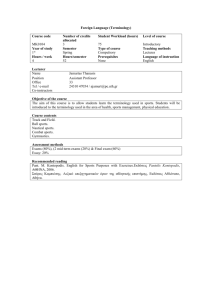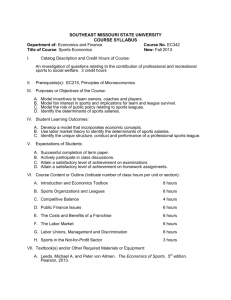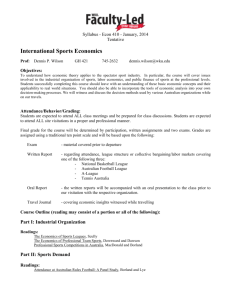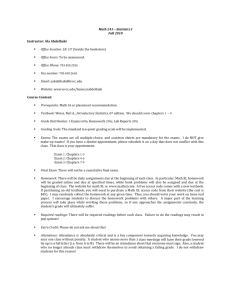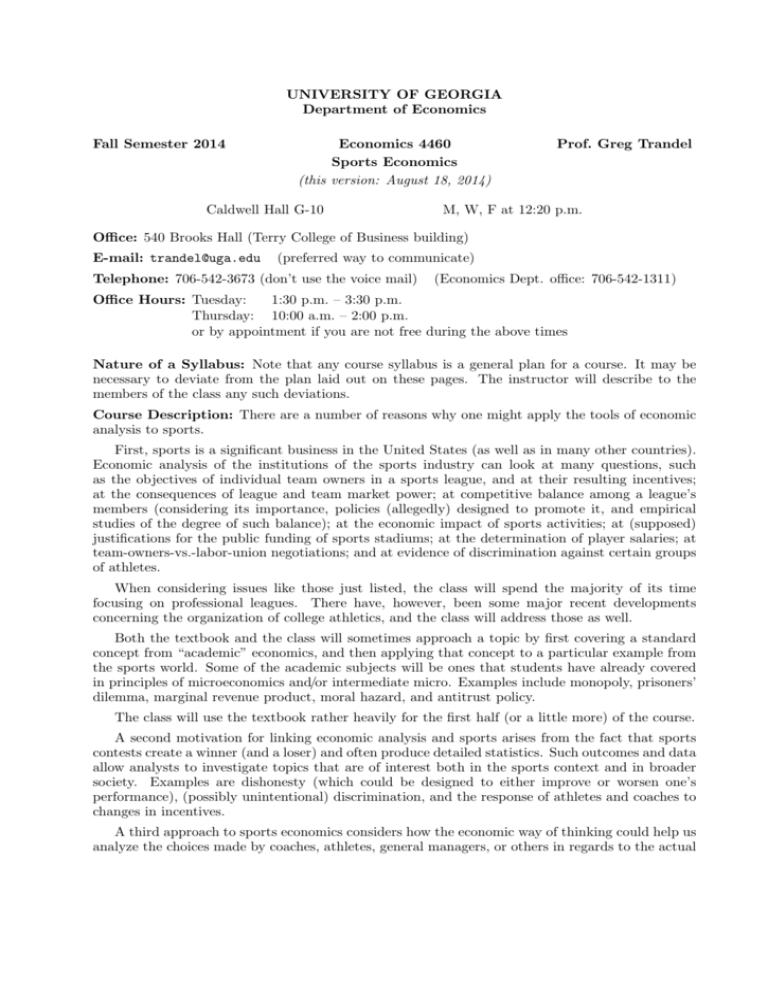
UNIVERSITY OF GEORGIA
Department of Economics
Fall Semester 2014
Economics 4460
Sports Economics
(this version: August 18, 2014)
Caldwell Hall G-10
Prof. Greg Trandel
M, W, F at 12:20 p.m.
Office: 540 Brooks Hall (Terry College of Business building)
E-mail: trandel@uga.edu
(preferred way to communicate)
Telephone: 706-542-3673 (don’t use the voice mail)
(Economics Dept. office: 706-542-1311)
Office Hours: Tuesday:
1:30 p.m. – 3:30 p.m.
Thursday: 10:00 a.m. – 2:00 p.m.
or by appointment if you are not free during the above times
Nature of a Syllabus: Note that any course syllabus is a general plan for a course. It may be
necessary to deviate from the plan laid out on these pages. The instructor will describe to the
members of the class any such deviations.
Course Description: There are a number of reasons why one might apply the tools of economic
analysis to sports.
First, sports is a significant business in the United States (as well as in many other countries).
Economic analysis of the institutions of the sports industry can look at many questions, such
as the objectives of individual team owners in a sports league, and at their resulting incentives;
at the consequences of league and team market power; at competitive balance among a league’s
members (considering its importance, policies (allegedly) designed to promote it, and empirical
studies of the degree of such balance); at the economic impact of sports activities; at (supposed)
justifications for the public funding of sports stadiums; at the determination of player salaries; at
team-owners-vs.-labor-union negotiations; and at evidence of discrimination against certain groups
of athletes.
When considering issues like those just listed, the class will spend the majority of its time
focusing on professional leagues. There have, however, been some major recent developments
concerning the organization of college athletics, and the class will address those as well.
Both the textbook and the class will sometimes approach a topic by first covering a standard
concept from “academic” economics, and then applying that concept to a particular example from
the sports world. Some of the academic subjects will be ones that students have already covered
in principles of microeconomics and/or intermediate micro. Examples include monopoly, prisoners’
dilemma, marginal revenue product, moral hazard, and antitrust policy.
The class will use the textbook rather heavily for the first half (or a little more) of the course.
A second motivation for linking economic analysis and sports arises from the fact that sports
contests create a winner (and a loser) and often produce detailed statistics. Such outcomes and data
allow analysts to investigate topics that are of interest both in the sports context and in broader
society. Examples are dishonesty (which could be designed to either improve or worsen one’s
performance), (possibly unintentional) discrimination, and the response of athletes and coaches to
changes in incentives.
A third approach to sports economics considers how the economic way of thinking could help us
analyze the choices made by coaches, athletes, general managers, or others in regards to the actual
play of a game, to post-play analysis, to assembling a team, or to making group decisions. Such
use of sports analytics has become very well known in recent years. Examples include methods of
player evaluation, the search for undervalued player skills, and rigorous analysis of decision making.
While some of the topics listed in the preceding two paragraphs are covered in the textbook,
the class will also use numerous articles from various academic journals and other publications to
investigate these subjects.
Research in sports economics sometimes receives substantial media attention. Over the course
of the semester, the class will cover at least a few of these of “current events” topics.
Textbook and Other Readings: The main text for this class is The Economics of Sports by
Michael A. Leeds and Peter von Allmen (Pearson, Addison-Wesley), 5th edition (2014). You should
have access to a copy of the book. The class will also utilize (later in the semester) some of the
material in the popular-press book Scorecasting by Tobias J. Moskowitz and L. Jon Wertheim. The
chapters from that book that are most relevant to the class will be posted on eLearning Commons,
but there’s much other material in the book that is also interesting, so you might want to consider
getting your own copy of it. Other readings — including both academic economic research papers
and journalistic pieces — will also be required. These additional readings will be posted on the
class’s eLC page.
Grading: Your grade for this class will be based on a final exam (worth 120 points, which counts for
33.3% of your semester grade), three in-class exams (each worth 70 points, or 19.4% of your grade),
a short paper — more details will be provided later — (15 points; 4.2%), and three homework
assignments (worth 15 points in total, or 4.2%). The grading scale is thus based on a maximum
possible score of 360 points. Semester grades will be based on a 90–80–70–60 scale. The plus/minus
grading option will be used for students who are quite close to the A/B and B/C dividing lines.
Note, however, that no C− grades will be assigned.
Homework: Three homework assignments that count towards your semester grade will be distributed during the semester. These assignments will be due at the beginning of class on the
following Fridays: September 12th, October 10th, and November 14th. The homework assignments will be checked, graded, and returned during the following class. We will spend part of that
class reviewing the homework questions.
Your grade on a homework assignment will depend (in part) on whether or not your answers
are correct and (more importantly) on the amount of effort you put into doing the assignment.
Late homework will not be accepted. If, however, you are unable to attend one of the relevant
classes, you can hand in your homework early (up to 12:15 p.m. on the day the assignment is due)
in Prof. Trandel’s office. Feel free to work together on homework. However, each of you is required
to write up and submit an independent answer sheet. This means that word-for-word copies will
not be accepted.
Exams: Tests will be given in class on the Wednesdays: September 17th, October 15th, and
November 19th. These tests will be noncomprehensive and will cover the material presented in
class up to and including the class preceding the exam, along with the relevant homework and
reading material. The final exam will be given at 12:00 noon on Friday, December 12th and will be
comprehensive.
Each test will be a mix of objective questions and questions that require either written or
calculated answers. The objective questions will generally be multiple choice. These questions can
come from class alone, from the textbook or other readings alone, or might be covered in multiple
sources. A good answer to a written-answer question will generally be a couple sentences long (i.e.,
shorter than “essay” length). For these questions, partial credit may be given.
2
On the days when exams are returned, the class will spend some time reviewing the test questions. After this has been done, the exams will be returned to the instructor. Students can again
see those exams either in any of the instructor’s office hours, or during the last class meeting (when
the exams will again be brought to the classroom).
Test scores (as well as final semester grades) will be posted through the eLC system.
A student who misses a test without making prior arrangements will receive a grade of zero on
that exam. If any circumstances that will prevent a student from taking an exam arise, he or she
should talk to Prof. Trandel as soon as possible. If a student has any special problems, such as a
potential “incomplete” grade, he or she may wish to contact the office of the Vice President for
Student Affairs at studentaffairs.uga.edu or 542-3564.
Short Paper: Students are required to write a short (three- to four-page paper) related to one of
the topics covered in class.
More detailed information about this assignment will be provided in the fourth or fifth week of
the semester.
The paper is due on the last day on which class meets: Tuesday, December 9th.
ECON 6460: Students who are registered for ECON 6460 rather than ECON 4460 (or who are
choosing an honors option version of the class) will have to complete an additional assignment.
Please talk to the instructor about this fairly early in the semester.
Class vs. Text: The lectures and the reading assignments in this class are designed to complement
(rather than duplicate) each other. As a result, to get the full benefit of the class, you must both
attend lecture and read the assignments.
The exams will reflect the fact that the lectures and the readings are not perfect substitutes. In
other words, some test questions will be based on class material that is not found in the textbook,
while others may cover topics discussed in the readings, but not in class. Attendance will not be
recorded in this class, but the exam format ensures that your test scores (and your class grade) will
suffer if you fail to attend class on a regular basis.
Academic Honesty: As a University of Georgia student, you have agreed to abide by the University’s academic honesty policy, “A Culture of Honesty”, and the Student Honor Code. All academic
work must meet the standards described in “A Culture of Honesty” found at: honesty.uga.edu.
Lack of knowledge of the academic honesty policy is not a reasonable explanation for a violation.
Questions related to course assignments and the academic honesty policy should be directed to the
instructor.
Miscellaneous: While it is sometimes difficult to ask questions during class, please do not hesitate
to do so. Any instructor needs to know when he or she is going too fast or not being clear. Please
ask questions — you’ll perform a service for yourself, for your classmates, and for the instructor.
One additional note for this particular class. We’ll sometimes discuss topics that are related
to the rules/methods of play of various sports. While we’ll briefly cover those rules in class, the
information presented may not be sufficient for students who have little familiarity with the relevant
sport. A student who finds him- or herself in such a situation is encouraged to ask questions either
during or after class, or in office hours.
Approximate Class Schedule: The following material gives a rough idea of what topics (and
what textbook chapters) will be covered on each of the class’s three exams. It’s likely that the
actual topics to be covered on each exam won’t exactly match what is listed below. The precise
3
coverage of each test, as well as the reading assignments — both in the textbook and outside
readings — for each week, will be made clear in class throughout the semester.
• Exam I (on Wednesday, September 17th):
Topics: league structure, objectives, and decisions; team-owner objectives and decisions; profits
and profit maximization; monopoly and cartels; competitive-balance issues; team movement;
the rise of free agency.
Readings: Leeds and von Allmen, chs. 1, 3, 4, and 5; various additional material to be posted
on eLC. [Note: the material from ch. 2 and its appendices — which covers theoretical and
empirical economics — will not covered in one chunk; various topics will instead be addressed
at the time when the material is needed.
• Exam II (on Wednesday, October 15th):
Topics: management-union negotiations and collective bargaining agreements; salary determination; the economic impact of sports franchises and events, and (public) financing of stadiums;
pro-sports tours; discrimination.
Readings: Leeds and von Allmen, chs. 8, 9, 6, 7, and 10; additional material to be posted.
• Exam III (on Wednesday, November 19th):
Topics: college sports organization and compensation; sports analytics; player evaluation; optimal
general-manager and coach decisions; possible cheating and detection; unintentional discrimination.
Readings: Leeds and von Allmen, ch. 11; additional material to be posted.
• New Material for (comprehensive) Final Exam (on Friday, December 12th):
Topics: any of the above topics not yet covered; motivation for rules changes, and responses to
such changes; home field advantage; to be determined.
Readings: chapters from Scorecasting; additional material to be posted.
4

